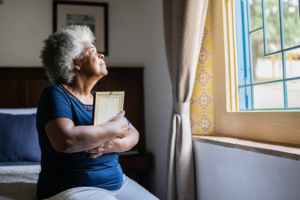How to Help an Older Adult Who Is Grieving

An older adult who is grieving needs lots of support to get through this difficult time.
By the time we reach our golden years, we’ve had many years of building deep connections with family and friends. These bonds are crucial to our quality of life, and when they are severed, it inevitably leads to feelings of deep loss.
You may feel hopeless to help an older adult who is grieving, but there are steps you can take. It begins with understanding more about this powerful emotion.
What Should You Know About Grief in Older Adults?
Grief Is Complex
- Grief in older adults is a complicated emotional reaction to a variety of losses, including the passing of family members, declining health, or changes in independence.
- Acknowledging the unique nature of each older adult’s grieving process is essential for offering individualized support.
Grief Effects Mental Health
- Grief can manifest in a variety of ways, impacting mental health and well-being.
- Seniors may experience feelings of loneliness and sadness, as well as physical symptoms such as changes in sleep patterns or appetite.
Grief Is a Process
- The grieving process is non-linear and unique to each individual, encompassing stages such as denial, anger, depression, bargaining, and acceptance.
- Seniors may revisit these stages at different times, necessitating patience and empathy from caregivers and loved ones.
How Can You Help an Older Adult Who Is Grieving?
Encourage Healthy Coping Mechanisms. Engaging in activities that bring joy and comfort is important for dealing with grief. Encourage the person to pursue hobbies, take part in social interactions, and practice mindfulness. In addition, emphasizing a healthy lifestyle, including regular exercise and nutritious meals, contributes to their resilience and overall well-being during challenging times.
Seek Professional Support. Grief is a complex emotional experience, and professional support can offer valuable guidance. Encourage the individual to explore counseling or join a support group tailored to their needs. Professional resources offer tools for managing emotions, coping strategies, and also the comfort of a supportive community, aiding in the healing process.
Maintain Open Channels of Communication. Grieving seniors often face the struggle of expressing their emotions. Encourage open communication, providing a safe space in order for them to share their feelings. Be a compassionate listener, offering understanding and reassurance without judgment. Creating an environment where emotions can be expressed fosters a sense of connection and healing.
Strengthen Community Connections. Building a supportive community is crucial for someone facing grief. Create opportunities for social interactions, and make certain they maintain connections with family, friends, and community resources. Establishing a network of support can provide a sense of belonging, reducing feelings of isolation and fostering a supportive environment for healing.
We’re here to assist older adults who are struggling through times of bereavement. Our compassionate, kind care professionals provide both a listening ear and engaging activities to help make each day a little brighter. Contact us online or give us a call at 954-486-6440 for assistance and support in Fort Lauderdale, Hollywood, Lighthouse Point, or the surrounding areas.
